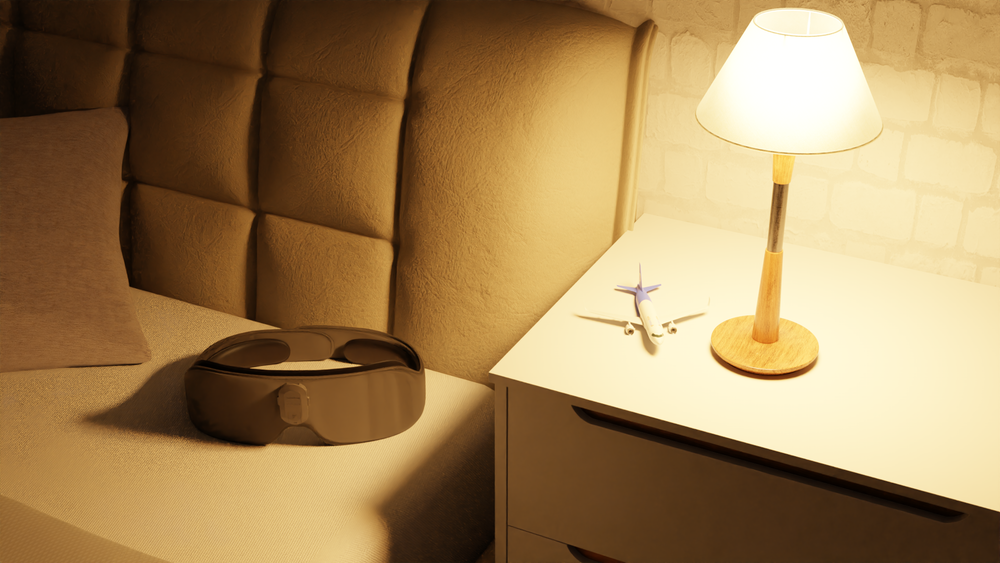If you or someone you know has experienced a throbbing headache accompanied by nausea, sensitivity to light and sound, and a general feeling of discomfort, chances are it was an acute migraine attack. If you’re thinking that it was nothing more than just headaches; you might be making a mistake as they are a complex neurological condition that affects millions of people worldwide.
With that said, let’s explore acute migraines, including their causes, symptoms, and treatment options. By gaining a deeper understanding of this condition, the aim is to empower readers with knowledge that can assist in managing and alleviating the impact of acute migraines.
So, if you're ready to deepen your understanding of acute migraines and explore the causes, symptoms, and treatment options available, let's dive into this informative journey together. By the end, you will be equipped with valuable insights that can empower you to take control of your migraine experience and improve your overall quality of life.
What Is Acute Migraine?

Migraine headaches are a prevalent and debilitating neurological condition that affects millions of people worldwide. Acute migraines, also known as migraine attacks, are episodes of intense and throbbing headache often accompanied by other symptoms such as nausea, sensitivity to light and sound, and visual disturbances. These attacks can last anywhere between a few hours to several days, significantly impacting an individual's quality of life and daily functioning. While the exact cause of acute migraines remains unknown, various triggers such as hormonal changes, stress, certain foods, and environmental factors can often precede an attack. Recognizing the characteristic symptoms and understanding the triggers can help individuals seek appropriate treatment and management strategies to alleviate the disabling effects of acute migraines.
What Causes Acute Migraines?
Acute migraines are severe headaches that can be debilitating and affect daily functioning. Several factors and potential causes can contribute to the development of acute migraines.
Triggers play a significant role in provoking acute migraines. Stress is a common trigger, as heightened stress levels can lead to the release of certain chemicals in the brain that may trigger migraines. Certain foods, such as chocolate, caffeine, and processed foods, have also been associated with migraine attacks. Hormonal changes, particularly in women, can be a contributing factor as well. Fluctuations in estrogen levels during menstrual cycles, pregnancy, or menopause can trigger migraines in susceptible individuals.
Environmental factors can also be culprits in triggering migraines. Changes in weather or barometric pressure, exposure to strong odors or bright lights, and even noise can provoke migraines in some individuals.
The concept of sensitization of the trigeminal nerve also plays a role in migraine pain. The trigeminal nerve is responsible for transmitting pain signals to the brain. In individuals with migraines, the nerve becomes more sensitive and can transmit pain signals even with minor triggers.
Abnormal brain activity is another potential cause of acute migraines. Research suggests that abnormal activity in specific areas of the brain, such as the hypothalamus, plays a role in the initiation and progression of migraines.
What Are the Symptoms of Acute Migraines?
In migraines with aura, individuals may experience visual disturbances, such as seeing flashing lights, zigzag lines, or blind spots. Some may also have difficulty speaking or find it challenging to understand speech. These warning signs can occur before the headache pain starts, giving sufferers time to prepare or take medication.
The severity of the headache pain can vary from person to person. For some, it may feel like a pounding sensation, while for others, it can be a constant ache. Nausea and vomiting are common accompanying symptoms of acute migraines, and they can make it difficult for individuals to eat or stay hydrated.
Sensitivity to light and sound is another characteristic of acute migraines. Even normal levels of light and sound can worsen the pain and discomfort. Many people also experience fatigue and dizziness during migraine attacks, which can make it challenging to carry out daily activities.
Who Are at Risk of Having Acute Migraine?

One of the most influential risk factors is biological family history. Individuals with a family history of migraines are more likely to develop acute migraines themselves. This suggests a genetic component to the condition, with certain genes predisposing individuals to migraines.
Another significant risk factor for acute migraines is the regular use of tobacco products. Studies have shown that smoking or using other tobacco products can increase the frequency and severity of migraines. The exact mechanisms behind this association are not fully understood, but it is believed that the chemicals in tobacco may trigger migraines or worsen existing episodes.
The population at risk of experiencing acute migraines includes individuals with a family history of migraines, especially those with first-degree relatives who have been diagnosed with the condition. Additionally, individuals who regularly use tobacco products, including cigarettes, cigars, or chewing tobacco, are also at an increased risk of developing migraines. It is important for healthcare professionals to be aware of these risk factors and educate patients about lifestyle modifications that can help reduce the likelihood of experiencing acute migraines.
How to Deal with Acute Migraine?

Dealing with acute migraines can be challenging, but there are several strategies that can help you manage and alleviate the symptoms. Here are some tips on how to deal with acute migraines:
- Identify and avoid triggers: Keep a migraine diary to track potential triggers such as certain foods, lack of sleep, stress, or hormonal changes. Once you identify your triggers, try to avoid or minimize exposure to them.
- Create a calm and quiet environment: During a migraine attack, find a quiet, dark room where you can rest and relax. Avoid bright lights, loud noises, and strong smells, as they can worsen your symptoms.
- Apply cold or hot compresses: Placing a cold or hot compress on your forehead or the back of your neck can provide relief. Experiment with both options to see which one works best for you.
- Practice relaxation techniques: Engaging in relaxation techniques such as deep breathing, meditation, or progressive muscle relaxation can help reduce stress and promote a sense of calm during a migraine attack.
- Try over-the-counter pain relievers: Non-prescription pain relievers such as ibuprofen or aspirin can sometimes help alleviate mild to moderate migraine pain. However, it is essential to follow the recommended dosage and consult with a healthcare professional if you have any concerns.
- Consider prescription medications: If your migraines are severe or frequent, your doctor may prescribe specific medications to help manage and prevent attacks. These may include triptans, ergots, or anti-nausea medications. It is important to discuss the potential benefits and risks of these medications with your healthcare provider.
- Explore alternative therapies: Some individuals find relief through alternative therapies such as acupuncture, massage, biofeedback, or cognitive-behavioral therapy. These approaches can help manage pain, reduce stress, and improve overall well-being.
- Practice healthy lifestyle habits: Maintain a regular sleep schedule, eat balanced meals, stay hydrated, and engage in regular exercise. Adopting healthy lifestyle habits can help reduce the frequency and severity of migraine attacks.
- Seek support: Reach out to support groups or connect with others who experience migraines. Sharing your experiences and learning from others can provide emotional support and helpful tips for managing migraines.
- Consult a healthcare professional: If your migraines significantly impact your daily life, it is important to consult with a healthcare professional. They can provide personalized advice, help identify underlying causes, and develop a comprehensive treatment plan tailored to your needs.
Remember, everyone's experience with migraines is unique, so it may take time to find the most effective strategies for managing your acute migraines. Be patient with yourself and keep an open line of communication with your healthcare provider to ensure you receive the best possible care.
Takeaway
Acute migraines are a complex neurological condition that affects millions of people worldwide. They are characterized by intense and throbbing headaches accompanied by symptoms such as nausea, sensitivity to light and sound, and visual disturbances. The exact cause of acute migraines is unknown, but triggers such as stress, hormonal changes, certain foods, and environmental factors can often precede an attack. Recognizing the symptoms and understanding the triggers can help individuals seek appropriate treatment and management strategies.
Dealing with acute migraines can be challenging, but there are strategies to manage and alleviate the symptoms. It is essential to identify and avoid triggers, create a calm and quiet environment, apply cold or hot compresses, practice relaxation techniques, and consider over-the-counter pain relievers or prescription medications if necessary. Exploring alternative therapies and adopting healthy lifestyle habits can also be beneficial. Seeking support from support groups and healthcare professionals is important for personalized advice and treatment plans.
By gaining a deeper understanding of acute migraines and exploring the causes, symptoms, and treatment options available, individuals can take control of their migraine experience and improve their overall quality of life. It is important to remember that everyone's experience with migraines is unique, and it may take time to find the most effective strategies for managing them.
Renpho Health Tips
-

Understanding Academic Stress in Students: Causes, Effects, and Solutions
April 1, 2024
Read more >
-

Blossoming Relief: Unveiling the Headache-Soothing Powers of Spring Flowers
March 27, 2024
Read more >
-

5 Effective Self-Help Strategies for Anxiety Relief
March 25, 2024
Read more >
-

Say Goodbye to Jet Lag: 5 Proven Techniques for a Restful Travel Experience
March 15, 2024
Read more >
-

The Connection Between Massage Guns and Better Sleep
May 23, 2023
Read more >
